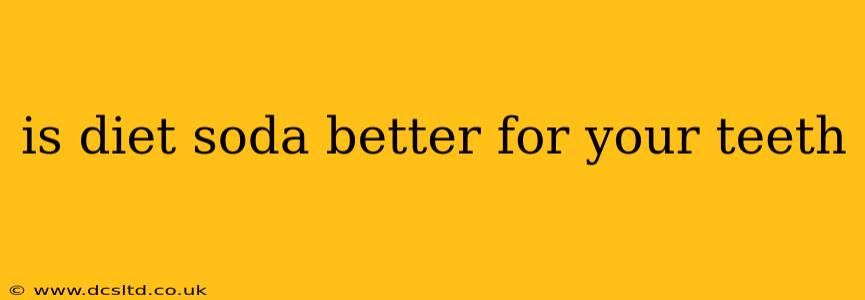The age-old debate: is diet soda a healthier choice for your teeth than its sugary counterpart? While it might seem like a simple swap, the reality is far more nuanced. Let's delve into the surprising truth about diet soda and its impact on your oral health.
The Main Culprit: Acid Erosion
Both regular and diet sodas are highly acidic, boasting a pH level significantly lower than that of saliva. This acidity is the primary culprit behind tooth enamel erosion, regardless of whether sugar is present. The acid attacks the enamel, weakening it and making it more susceptible to cavities and sensitivity. Think of it like constantly bathing your teeth in a weak acid – over time, the damage adds up.
Sugar's Role (or Lack Thereof)
While sugar contributes to cavities by feeding bacteria that produce acid, diet soda avoids this direct contribution. However, the acid in diet soda still creates a conducive environment for those bacteria to thrive and produce acid, ultimately contributing to the erosion process. It’s a crucial point to understand: the absence of sugar doesn't equate to a lack of harm.
Does Diet Soda Cause Cavities?
While diet soda doesn't contain sugar, it doesn't get a free pass when it comes to cavities. The high acidity weakens enamel, making it more vulnerable to cavities. The bacteria in your mouth still produce acid, even without the extra sugar boost, leading to potential enamel erosion and ultimately cavities.
Is Diet Soda Better Than Regular Soda for Teeth?
The short answer is: no, not significantly. While diet soda avoids the direct cavity-causing effect of sugar, the high acidity in both regular and diet sodas poses a similar threat to tooth enamel. The difference is subtle; both are harmful to teeth, leading to increased risk of erosion and sensitivity.
What About Artificial Sweeteners?
Artificial sweeteners used in diet sodas have been subject to scrutiny, but current research hasn't definitively linked them to direct tooth decay. However, the acidic nature of the drink itself remains the primary concern.
How to Minimize Soda's Impact on Your Teeth
If you consume soda, whether diet or regular, consider these strategies to minimize the damage:
- Limit Consumption: The less you drink, the less exposure your teeth have to acid.
- Rinse Your Mouth: After drinking soda, rinse your mouth thoroughly with water to help neutralize the acid.
- Wait to Brush: Brush immediately after drinking soda can further damage weakened enamel. Wait at least 30 minutes.
- Choose Water: Opt for water as your primary beverage. It's the best choice for your oral health.
- See Your Dentist Regularly: Regular checkups and professional cleanings are crucial for monitoring your oral health and catching any potential problems early.
Conclusion:
The myth that diet soda is a healthier alternative for your teeth needs to be debunked. While it lacks the sugar directly contributing to cavities, the high acidity remains a major concern, causing enamel erosion and increasing the risk of dental problems. Moderation is key, and water remains the best choice for your dental health. Prioritize regular dental checkups and healthy habits to maintain strong, healthy teeth.
